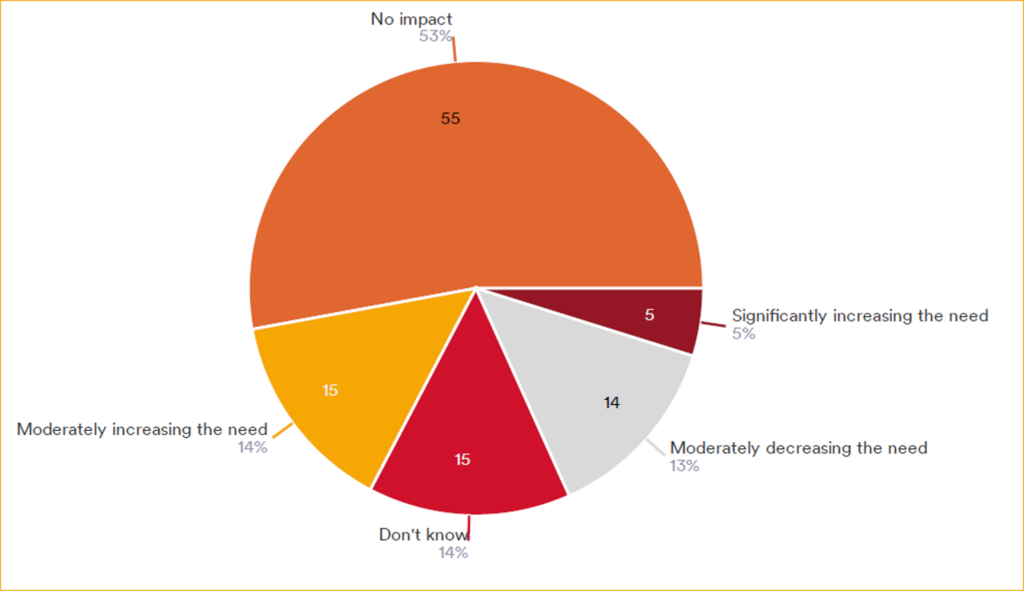
07 Oct AI in Marketing: Empowering Professionals, Not Replacing Them
In recent years, the buzz around artificial intelligence has led to both excitement and apprehension in the marketing world. Our inaugural 2024 Social Media Trends survey asked marketers “How Much is AI Impacting your Need for Social Media Resources” and the results revealed that AI is emerging as a powerful ally rather than a job-stealing threat.
Let’s dive into the numbers:
A substantial 53% of respondents reported no impact on their resource needs due to AI. This majority suggests that for many teams, either AI has seamlessly integrated into existing workflows without causing disruptive changes or they simply aren’t using it.
Only 5% indicated AI was significantly increasing their need for resources. This small percentage implies that while AI may create some new roles or skill requirements, it’s not overwhelming most marketing departments.
14% saw a moderate increase in resource needs, possibly reflecting investments in AI tools or training programs to upskill team members.
Interestingly, 13% experienced a moderate decrease in resource needs. This could indicate efficiency gains, but not at the expense of human roles – rather, it might allow teams to reallocate resources to more strategic initiatives.
14% were uncertain about AI’s impact, highlighting that its role is still evolving and not fully understood by all professionals in the field.

What do these findings mean for social media marketers and the broader marketing landscape?
AI as an Enhancer, Not a Replacer:
The data clearly shows that AI isn’t eliminating marketing jobs en masse. Instead, it’s augmenting human capabilities, allowing marketers to work smarter and more efficiently. AI can handle data analysis, content optimization, and personalization at scale, freeing up human marketers to focus on strategy and creative thinking.
Shifting Skill Sets:
While AI excels at handling repetitive tasks and data-driven processes, it can’t replace the nuanced understanding of human emotions, cultural contexts, and creative intuition that skilled marketers bring to the table. As AI takes over certain tasks, marketers can focus on developing skills in areas like strategic planning, emotional intelligence, and cross-cultural communication – aspects that are crucial for creating resonant campaigns.
Adapting to New Tools:
The moderate increases in resource needs likely reflect the learning curve and integration phase of AI tools. Forward-thinking marketers are investing time in understanding and leveraging AI technologies. This adaptation period is crucial for long-term productivity gains and staying competitive in the evolving digital landscape.
Balanced Approach:
With most respondents seeing no impact or only moderate changes, it’s clear that successful teams are finding a balance between AI assistance and human expertise. This hybrid approach allows for the best of both worlds – the efficiency and scalability of AI combined with the creativity and emotional intelligence of human marketers.
Opportunity for Innovation:
As AI takes care of time-consuming tasks like data analysis and basic content creation, marketers have more bandwidth to experiment, innovate, and push creative boundaries. This could lead to more groundbreaking campaigns and strategies that truly capture audience attention in an increasingly crowded digital space.
Enhanced Decision Making:
AI’s ability to process vast amounts of data can provide marketers with invaluable insights. However, interpreting these insights and translating them into effective strategies still requires human judgment. AI is becoming an indispensable tool for informed decision-making, rather than a replacement for human strategic thinking.
Personalization at Scale:
One of AI’s most significant contributions to marketing is its ability to deliver personalized experiences to large audiences. While AI can crunch the numbers and segment audiences, human marketers are still crucial in crafting the overarching message and ensuring brand consistency across these personalized touchpoints.
Continuous Learning:
The uncertainty expressed by some respondents underscores the importance of continuous learning in the marketing field. Staying informed about AI developments and regularly upskilling will be key to thriving in this new landscape.
In conclusion, AI in marketing isn’t about replacement – it’s about empowerment and evolution. By embracing AI as a collaborative tool, social media marketers can enhance their capabilities, streamline workflows, and focus on the uniquely human aspects of their roles that drive real connection and creativity in campaigns.
The future of marketing isn’t human versus machine – it’s human and machine, working in tandem to achieve unprecedented results. As we move forward, the most successful marketers will be those who learn to dance with AI, leveraging its strengths while honing the irreplaceable human skills that breathe life into brands and forge genuine connections with audiences.
Contact us today to learn more about how Ignite Social Media is staying at the forefront of AI in Social Media.

